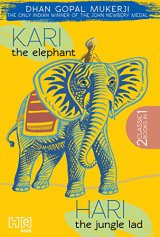Kari the Elephant Page #5
A nine-year-old boy raises and trains Kari the elephant, learning about the law of the jungle and the intelligence and the dignity of elephants.
Monkeys also get punished for using their hands too much. Now, if you come across a snake, the best thing to do is not to touch it. Monkeys, however, accustomed to using their hands continually, grab a snake whenever they see one with the result that the snake usually stings them to death. I have never seen a snake do this, but I have seen dead snakes with marks on their bodies showing that monkeys had twisted them like ropes, broken their backs and thrown them down before the snakes could use their fangs. This, however, is very rare. As we were going through the jungle that night, Kopee would shiver with terror whenever there was a swish of a snake's body in the grass below or in the leaves above, and I had to put my hand on his back and whisper, "Don't be afraid, you are on the elephant's back and nothing can touch you." Another thing that used to frighten him was the hooting of the night owl. Any monkey that lives in the jungle is used to it, but as Kopee was born among human beings and had always lived with them, he had never heard jungle noises. When the owls beat their wings and gave the mating call and hoot, it was like a foam of noise rising over a river of silence. I, too, was alarmed when I would suddenly hear the hooting in my sleep, but both Kopee and I soon got used to it. About four o'clock in the morning Kari stopped and refused to go a step further. Though I was asleep, Kopee began to pull me by the hand, and instantly after being aroused, I heard, or rather felt, as if clouds were passing by. The monkey's eyes were all eagerness and burning with excitement, and I looked down where he was looking. The honey-colored moon was casting slanting rays into the jungle through dark moving clouds. We did not know what we saw. It seemed as though two or three hundred wild elephants in a herd were going through the jungle, or perhaps the clouds were feeding on the leaves that night. No one knows what it was, but we did know Silence walked by, telling us of the mysteries of the jungle, and we could not understand. Then out of the stillness a bird's note fell through the jungle and there was a gleam of whiteness. That instant Silence was lifted, dawn began to sing through the jungle and you could hear its flute-like call fading away in the distance, followed by a momentary hush. Then the birds began to sing, and soon the sun came leaping over the forest like a horse of flame. This must have taken at least an hour and a half, but we did not even know when the elephant resumed his walk. We soon came to a river where we stopped. I gave the elephant his bath. The monkey went off in search of food from tree to tree. Then I bathed myself and stood facing the East, saying these words of prayer: "O Blossom of Eastern Silence, Reveal to us the face of God, Whose shadow is this day, and Whose light is always within us. Lead us from the unreal to the Real, From sound into Silence, From darkness unto Light, and From death into Immortality." In India every hour has its prayer and every prayer can be said unconsciously anywhere. Nobody notices you if you kneel down on the road to say your prayer, in spite of the fact that you are blocking the traffic. Religion runs like singing waters by the shores of every human life in India. I went to the forest nearby and got the elephant his food, and as he started to eat I began to cook my own meal. When traveling, it is better to cook one's own meal so that it will be clean and uncontaminated. Very soon I saw a caravan coming. Apparently Kopee had seen it from the tree-top as he was chattering with great excitement to tell me it was coming. I told him to hold his tongue because the elephant was getting restless. I decided to go with the caravan into the town because the caravan people knew the shortest way. I also preferred to travel in human company rather than alone. No sooner had the caravan reached us than our attention was drawn to the faces of the camels probing the distance. You know how a camel examines the air as he goes along--he is continually stretching forth his head and smelling the air, and he can do this easily with his long neck. As camels live in the desert they must keep smelling the air to find out its humidity. Every time the air is very humid they know that water is nearby. That is why we call camels the examiners of space; in your country you would call them animal barometers. The moment Kari saw the camels he snorted in anger, though the monkey was excited and thrilled. You see, elephants are the aristocrats of animals, while camels are snobs. You can easily tell a snob, he holds his head in a very supercilious way, always looking down on everyone, and don't you think if you put a monocle on a camel's eye he would look like any snob that walks down the avenue? Nevertheless, I made my elephant join the camels. That is to say, we kept about one hundred yards behind them because I could not let the monkey bound from camel hump to camel hump, and it would not do to let the elephant put his trunk about the camels' necks and twist them. Toward midday the whole caravan stopped and all the animals were tied under different trees for two or three hours to rest. As we knew we could easily reach the city by sun-down, we all enjoyed our siesta. About half-past three, the doves began to coo, and that made the monkey sit up and listen. Being a dweller of the trees by birth, Kopee was always sensitive to tree sounds. Soon a cuckoo called from the distance and in a few moments the caravan was ready to move on. Nothing exciting happened the rest of the journey. CHAPTER IV KARI'S ADVENTURE IN BENARES As the sun went down in the gathering silence of the evening, we entered the city of Benares, the oldest city in India. For three thousand years stone has been laid on stone to keep this city with its haughty towers and sombre domes above the rushing and destroying currents of the sacred river. The river like a liquid ax is continually cutting away the foundations of the city. At night you can hear the whispering Ganges gnawing at the stone embankments. And that is why all the tall towers of Benares lean slightly over the water's edge. Their roots are being cut as beavers cut the roots of trees. And any Hindu who comes into Benares feels the age of India; she has lived very long--indeed too long, and it seems time no more clings to her than the morning dew clings to the lion's mane. We went through Benares in a long, narrow file. The camels went first, and the monkey, who had jumped off my shoulder, was leaping from roof to roof following the tide of the caravan. Sometimes he would run ahead and chatter; and then suddenly disappear among roofs and walls. Then he would rush back to talk to me. I fastened two silver bells dangling from silver chains to the elephant's sides, and the cool sound of the bells sank into the cooler serenity of the Indian evening. People were walking about in purple and gold togas; on the house-tops were pigeons whose throats shone like iridescent beads. Through latticed balconies you could see the faces of women with eyes warm and tranquil as the midnight.
Translation
Translate and read this book in other languages:
Select another language:
- - Select -
- 简体中文 (Chinese - Simplified)
- 繁體中文 (Chinese - Traditional)
- Español (Spanish)
- Esperanto (Esperanto)
- 日本語 (Japanese)
- Português (Portuguese)
- Deutsch (German)
- العربية (Arabic)
- Français (French)
- Русский (Russian)
- ಕನ್ನಡ (Kannada)
- 한국어 (Korean)
- עברית (Hebrew)
- Gaeilge (Irish)
- Українська (Ukrainian)
- اردو (Urdu)
- Magyar (Hungarian)
- मानक हिन्दी (Hindi)
- Indonesia (Indonesian)
- Italiano (Italian)
- தமிழ் (Tamil)
- Türkçe (Turkish)
- తెలుగు (Telugu)
- ภาษาไทย (Thai)
- Tiếng Việt (Vietnamese)
- Čeština (Czech)
- Polski (Polish)
- Bahasa Indonesia (Indonesian)
- Românește (Romanian)
- Nederlands (Dutch)
- Ελληνικά (Greek)
- Latinum (Latin)
- Svenska (Swedish)
- Dansk (Danish)
- Suomi (Finnish)
- فارسی (Persian)
- ייִדיש (Yiddish)
- հայերեն (Armenian)
- Norsk (Norwegian)
- English (English)
Citation
Use the citation below to add this book to your bibliography:
Style:MLAChicagoAPA
"Kari the Elephant Books." Literature.com. STANDS4 LLC, 2025. Web. 8 Mar. 2025. <https://www.literature.com/book/kari_the_elephant_392>.








Discuss this Kari the Elephant book with the community:
Report Comment
We're doing our best to make sure our content is useful, accurate and safe.
If by any chance you spot an inappropriate comment while navigating through our website please use this form to let us know, and we'll take care of it shortly.
Attachment
You need to be logged in to favorite.
Log In